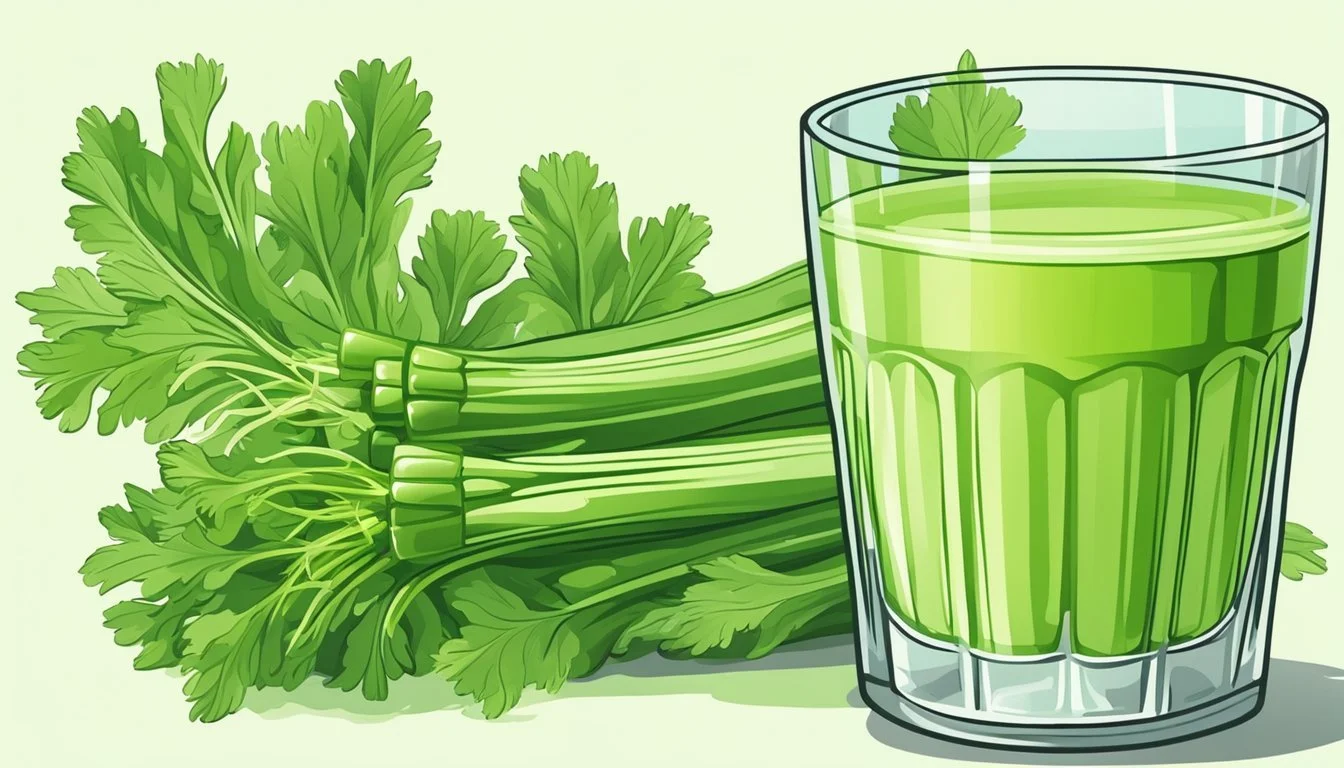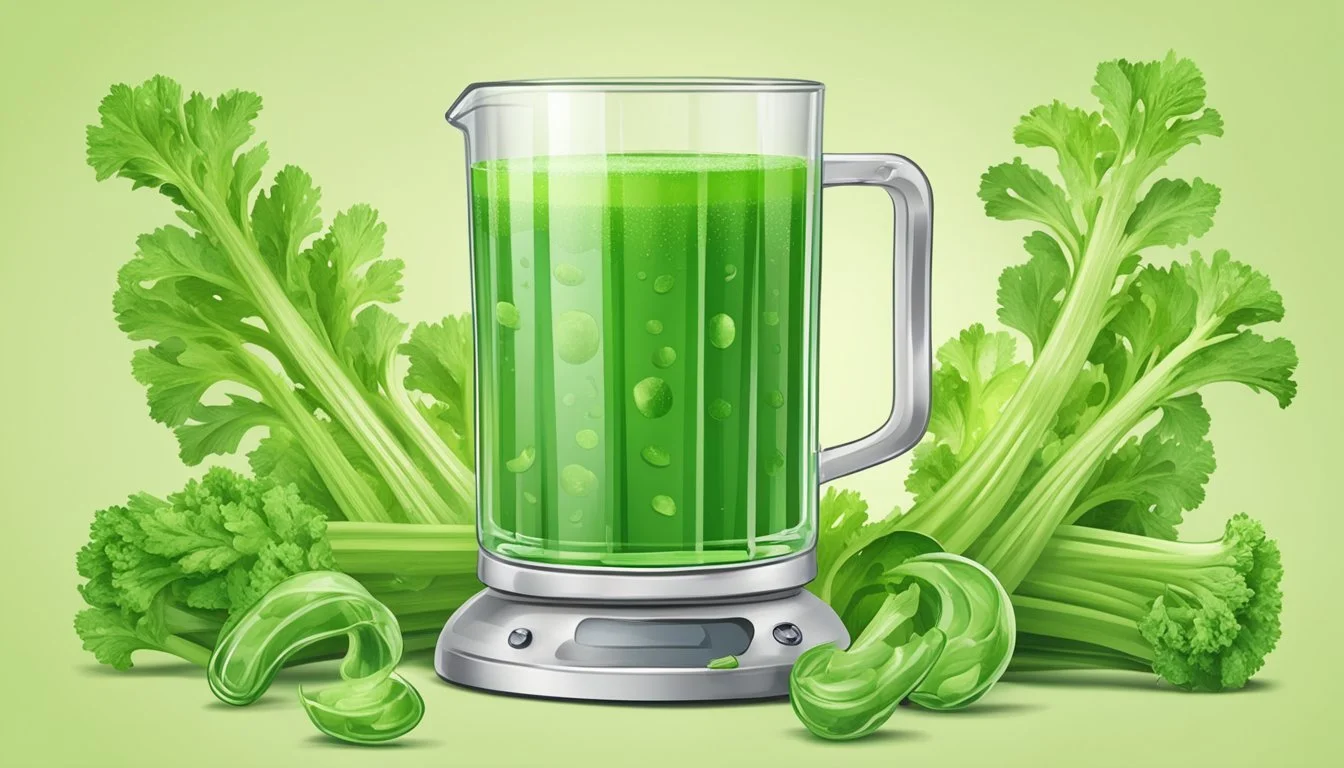The Truth About the Benefits of Drinking Celery Juice
Separating Fact from Fiction
In recent years, celery juice has surged in popularity, often hailed as a wellness elixir on social media platforms like Instagram. This green beverage has been credited with a variety of health benefits, ranging from improved digestion to detoxification. Its proponents often share anecdotal evidence of its positive effects, claiming dramatic health transformations. However, amidst the trendiness and self-reported testimonials, it is essential to distinguish between scientifically-supported facts and personal experiences that may not be universally applicable.
Celery juice is extracted from the stalks of the celery plant and is typically consumed as a concentrated drink. It contains a range of nutrients including vitamins, minerals, and antioxidants. Celery is low in calories and contains notable amounts of fiber when eaten whole, though juicing celery removes much of the fiber. Some proponents argue that drinking the juice provides more concentrated nutrients compared to consuming the whole vegetable, though the process of juicing may also reduce the presence of certain vitamins sensitive to heat and oxygen.
The celery juice trend has been met with both enthusiasm and skepticism by health experts and nutritionists. While there are acknowledged general benefits to consuming vegetables, the scientific scrutiny of pure celery juice is relatively sparse. In the cases where celery juice is purported to heal or prevent diseases, caution should be exercised and professional medical advice sought. The distinction between established nutritional science and the expansive claims made by some advocates of celery juice is crucial for understanding the true health potential of this widely-discussed drink.
Understanding Celery Juice
Celery juice has been touted for its potential health benefits, which some believe are attributable to its nutritional profile. In this section, we examine the composition of celery juice and how it compares to consuming whole celery.
Composition and Nutritional Profile
Celery juice is rich in various nutrients such as vitamins, minerals, and antioxidants. An 8-ounce serving typically contains about 33 calories, 189 milligrams of sodium, 2 grams of protein, and a significant amount of vitamin K. It is also a source of minerals such as calcium, magnesium, and potassium. The juicing process, however, may lead to the loss of some vitamins, including vitamin C, due to heat and oxygen exposure.
Nutritional breakdown of 8-ounce celery juice:
Calories: 33
Protein: 2g
Carbohydrates: 7g
Dietary fiber: 0g (fiber is removed during juicing)
Sodium: 189mg
Vitamin K: Significant amount
Vitamin C: Reduced through juicing
Calcium, magnesium, potassium: Present in varying amounts
Comparing with Whole Celery
Whole celery is known for its high dietary fiber content, which is virtually non-existent in celery juice due to the juicing process that removes plant solids. Fiber is beneficial for digestive health and may aid in maintaining healthier cholesterol levels. In terms of nutrients, a cup of juice made from several stalks would generally concentrate more vitamins and minerals than a cup of chopped celery, due to the quantity of celery used. However, a significant part of the nutritional value, particularly vitamin C and fiber, can be lost after juicing. Additionally, the higher concentration of sodium in celery juice should be taken into consideration, especially for those monitoring their salt intake.
Comparison between 1 cup of celery juice and 1 cup of chopped celery:
Fiber: High in whole celery, none in juice
Nutrients: More concentrated in juice (except for fiber and certain vitamins)
Sodium: Higher in juice
Calories: Juice may have more calories due to more celery being used per serving compared to chopped celery
By understanding the nutritional makeup of celery juice and how it differs from whole celery, individuals can more effectively integrate it into a balanced diet. The decision to include celery — in juiced or whole form — depends on one's dietary needs and health goals.
Health Benefits of Celery Juice
Celery juice has been recognized for its potential health benefits, especially concerning digestive health, cardiovascular support, anti-inflammatory and antioxidant effects, and its role in weight management.
Digestive Health and Hydration
Digestive Health: Celery juice may support the digestive system due to its hydration properties and nutrient content. It is believed to have a hydrating effect on the gastrointestinal tract, which can help regulate digestion. Additionally, the fibrous nature of celery helps add bulk to stools, which can aid in preventing constipation.
Hydration: Compared to plain water, celery juice provides an additional nutrient-rich option for hydration. The electrolytes present in celery juice make it an effective hydrating agent, potentially more so than water alone, for replenishing the body's needs.
Cardiovascular Implications
Blood Pressure: Celery juice contains compounds that may be beneficial for blood vessels and could help manage blood pressure levels. Research suggests that celery juice has properties that can relax the muscles of the arteries, potentially reducing high blood pressure and supporting heart disease prevention.
Heart Disease and Cholesterol: Although more research is necessary, preliminary findings indicate that celery juice might contribute to lowering cholesterol levels, thereby reducing the risk of heart disease.
Inflammation and Antioxidant Effects
Anti-Inflammatory Properties: Celery juice is known for its anti-inflammatory properties, and consuming it might aid in reducing inflammation in the body. The presence of antioxidant compounds in celery helps in mitigating the negative effects of free radicals and may, therefore, offer protection against certain diseases.
Antioxidants: Among its nutrients, celery juice is a source of antioxidants. These can combat oxidative stress, which is linked to a range of health issues. The presence of these antioxidant compounds in celery juice makes it a valuable drink for its potential disease-preventing properties.
Role in Weight Management
Low-Calorie: As a low-calorie beverage, celery juice can be a suitable addition to a weight loss diet. The low calorie content makes it an appropriate alternative to higher-calorie drinks, potentially aiding in weight management without adding extra calories from fat.
Weight Loss: Incorporating celery juice, which is less calorie-dense than many snacks, could assist in weight loss efforts when combined with a balanced diet and exercise. Its role as a low-calorie snack option may help prevent overconsumption of calories throughout the day.
Myths vs. Science
The conversation surrounding celery juice is often polarized, with some advocating it as a panacea, while others demand rigorous scientific corroboration. This section dissects the dichotomy between exuberant claims and evidence-backed findings.
Addressing the Hype
Celery juice has become something of a trend on platforms like Instagram, buoyed by influencers and the food fad culture. Its promotion as a cure-all for a wide range of health issues is a central element of the hype, often amplified by anecdotal endorsements rather than substantiated research. The term "Medical Medium," although widely associated with the celery juice movement, originates from a specific individual rather than credible scientific communities. As such, its reliability is not founded in evidence-based medicine.
Critical View of Research
When examining the therapeutic claims of celery juice, one must scrutinize the research underpinning these assertions. Evidence-based medical studies do recognize the nutritional content of celery juice; it's rich in vitamins and minerals. However, it is crucial to look for peer-reviewed studies with adequate sample sizes and methodologies. To date, there are limited comprehensive studies that offer robust evidence to the vast health benefits ascribed to celery juice. Without this research, scientifically-minded circles remain skeptical of celery juice's supposed efficacy.
Risks & Considerations
While celery juice offers certain health benefits, it’s crucial to consider its nutritional profile and the potential side effects it may have when consumed in large quantities or as a substitute for a more balanced diet.
Nutritional Adequacy and Potential Deficiencies
Celery juice, though rich in certain vitamins and minerals, should not replace whole foods such as fruits, whole grains, and fats that are essential for a balanced diet. It lacks the fiber found in whole celery, which is crucial for digestive health. Additionally, relying exclusively on celery juice could lead to deficiencies in vital nutrients that are better sourced from a varied diet, including fats that are necessary for the absorption of fat-soluble vitamins.
Possible Side Effects
Consuming celery juice might lead to allergic reactions in some individuals. Symptoms could include swelling or allergic reactions. Celery also contains compounds called psoralens, which may become problematic when one is exposed to sunlight. Research involving mice has shown that high levels of psoralens can cause skin sensitivity. Moreover, if not balanced with other nutrient sources, excessive consumption of celery juice can also lead to an imbalance in minerals and vitamins, undermining overall health.
Celery Juice in a Balanced Diet
Celery juice can be a healthful addition to a balanced diet when consumed in moderation. It is essential to consider how it integrates with other dietary components to maintain nutritional harmony.
Incorporating Celery Juice Wisely
In the context of an anti-inflammatory diet, celery juice may contribute beneficially due to its purported phytochemical content. However, moderation is key, as the juice lacks the fiber found in whole celery stalks. Consuming celery juice should not replace intake of a wide variety of vegetables and fruits, which are critical for a Mediterranean diet pattern.
Morning routine: A glass of celery juice can be hydrating and refreshing.
Meal accompaniment: Pair with a balance of protein, fats, and carbohydrates.
Snack alternative: Opt for celery juice instead of high-calorie, sugary drinks.
Alternatives and Comparisons
While celery juice provides certain nutrients, other whole foods and beverages might also offer similar benefits.
Kale: A nutrient-rich alternative that could be added to a smoothie for added fiber.
Tea: Herbal teas can be a source of antioxidants without the calories.
Plain water: Always the best choice for hydration.
Fruits and vegetables: Incorporating a variety leads to a wider array of nutrients.
Beverage Benefits Considerations Celery Juice Hydration, Nutrients Low in fiber Kale Smoothie Fiber, Nutrients Higher in calories Herbal Tea Antioxidants May contain less vitamins Plain Water Hydration No calories, essential
It's important to compare these options and choose the one that best fits individual health goals and dietary needs.
Consumer Insights
This section evaluates the role of celebrities and influencers in shaping public opinion on celery juice and explores trending perceptions surrounding its health benefits.
Popularity Among Celebrities and Influencers
Celebrities and influencers have played pivotal roles in the assimilation of celery juice into the daily regimes of health-conscious individuals. Instagram and other social media platforms are saturated with endorsements from public figures, touting the health perks of this beverage. In the United States, icons like Kim Kardashian and Miranda Kerr have attributed their clear skin and energy to regular consumption, significantly amplifying the hype and visibility of celery juice within wellness circles.
Public Perception and Trends
The public’s perception of celery juice is largely reflective of broader trend dynamics in the wellness industry. Over the years, increases in search interest and consumption patterns suggest a rising curiosity and trial of celery juice among health enthusiasts. While some consumers are skeptical, viewing it merely as a passing fad, others share anecdotal evidence of their positive experiences, contributing to a sustained interest. Lists of purported benefits, from anti-inflammation to detoxification, circulate across communities, keeping the dialogue both lively and divided.
Conclusion
Drinking celery juice can be a healthy addition to one's diet when consumed as part of a balanced lifestyle. The practice offers various nutrients such as vitamins, minerals, and antioxidants. While it contributes to hydration and could support digestive health due to its fiber content, individuals should not rely on it as a cure-all solution for chronic illnesses.
A single 8-ounce serving typically contains 33 calories, 7 grams of carbohydrates, and a modest amount of protein. Its high sodium content, at 189 milligrams per serving, warrants moderation, particularly for those with hypertension.
There is no unequivocal scientific evidence suggesting that celery juice significantly impacts mental health. However, the role of a nutritious diet in overall well-being is widely acknowledged.
In conclusion, while celery juice contains health benefits, consumers should maintain realistic expectations. It should complement, not replace, comprehensive healthcare practices. Periodic consultation with medical professionals is advised to tailor personal dietary choices to one's specific health needs.




